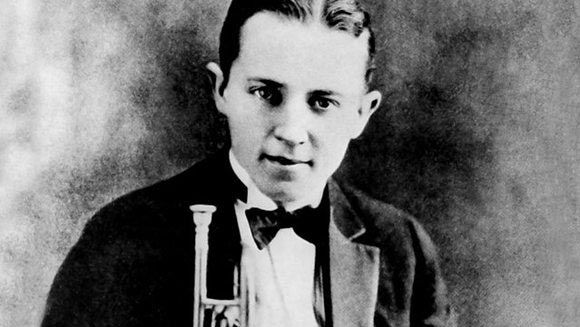
Leon Bismark Beiderbecke was an influential American Jazz Pianist, Cornetist and Composer who was also known by his stage name “Bix” Beiderbecke. He is known by some to be the father of the ‘cool jazz’ genre as well as the jazz ballad style.
Bix Beiderbecke was born on the 10 March 1903 in Davenport, Iowa. His mother was an organ player for her neighborhood’s Presbyterian Church, and she taught her son how to play the piano when he was only two years old. Beiderbecke’s talent with the piano was marvelous, by age seven he had gained popularity all over Davenport, part of which was due to a newspaper article that hinted at his ability to play any tune that he wanted. Beiderbecke’s early jazz influences would include the ‘Original Dixieland Jazz Band’ and Nick LaRocca. He would often evade his parent’s attention to catch hot jazz bands and one-off jazz performances at city clubs.
Beiderbecke’s professional career started when he joined the Wolverine Orchestra in 1923. The band would spend plenty of time playing at the Stockton Club in Ohio, covering pieces originally written by Nick LaRocca and Larry Shields. Beiderbecke was allowed the freedom to improvise and the band saw bouts of Beiderbecke’s unique hot-jazz style of soloing in their performances. He left the band in October 1924, and after a short stint at the University of Iowa, he finally met Frankie Trumbauer. Trumbauer was one of the most influential jazz saxophonists at the time, and he was known for his exceptionally technical melodies. The duo soon joined the highly popular Jean Goldkette group in Detroit. Even so, Beiderbecke’s performances in Detroit were not as adventurous as they were with Wolverine, as he was very formal and he kept his improvisation to a minimum. However, Beiderbecke would record independently with Trumbauer and guitarist Eddie Lang singles such as “Singin’ the Blues” and “Clarinet Marmalade”, both of which were known for Beiderbecke’s remarkable soloing ability. Another single which would shower immense attention on Beiderbecke was “I’m Coming, Virginia”. Solos from these pieces would form the platform for the jazz ballad style, a style which would ultimately go on to influence the likes of Bing Crosby and Lester Young.
At the collapse of the Jean Goldkette group, the Beiderbecke and Trumbauer duo joined the esteemed Paul Whiteman Orchestra. At that time (1927), Paul Whiteman was known as the ‘King of Jazz’, largely due to his performance of George Gershwin’s ‘Rhapsody in Blue’. Like Wolverine and Goldkette, the orchestra would spend a remarkable amount of time touring and recording with Beiderbecke until 1929.
Beiderbecke’s alcoholism ultimately took a toll on his musical ability and on his life. By 1930, it was said that ‘his improvisation ability left him’. It was also said that the cause of his death was Lobar Pneumonia, and that alcoholism could have been a factor. Beiderbecke died in his apartment on August 6, 1931. He is remembered as one of the most influential jazz soloists of the 1920s.